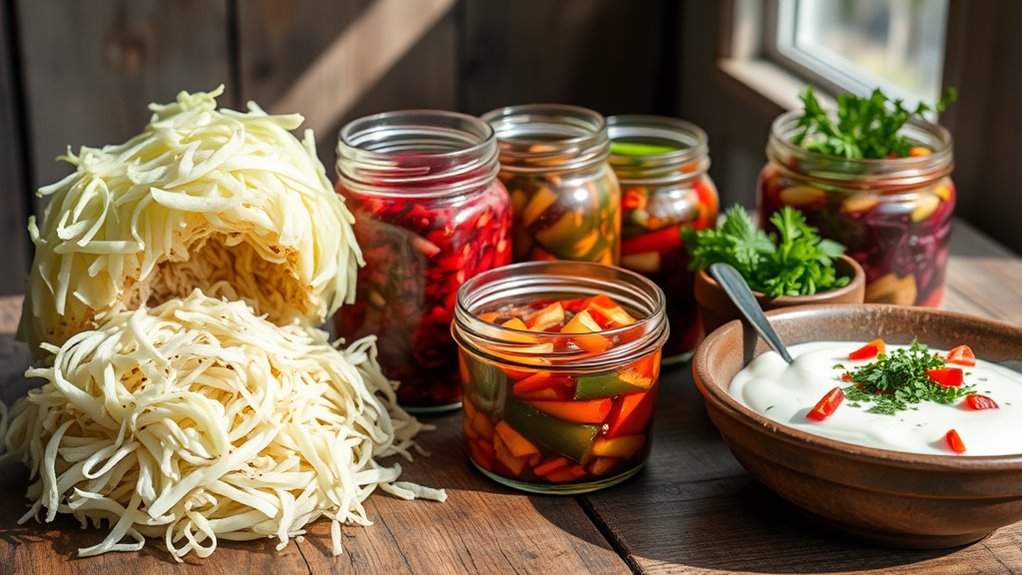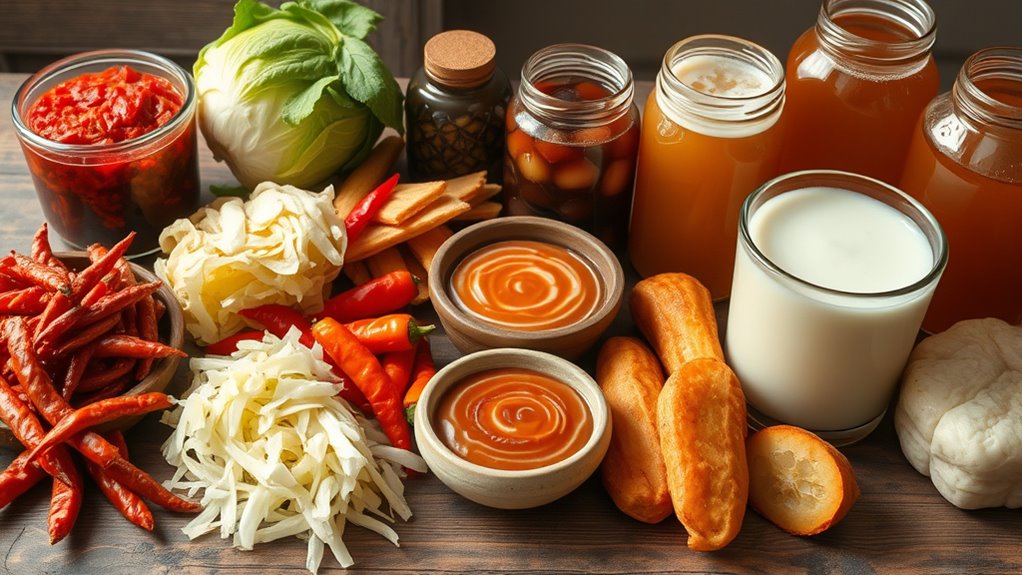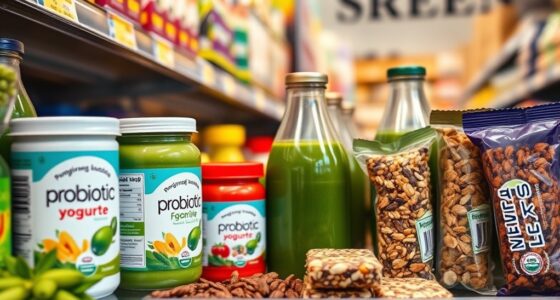Fermented foods have been a crucial part of many cultures for thousands of years, offering both tradition and health benefits. By consuming options like yogurt, kimchi, and sauerkraut, you introduce beneficial probiotics that support your gut health, boost your immune system, and increase nutrient absorption. These foods also act as natural preservatives and enhance flavors. If you want to explore how traditional fermentation plays a role in your health, keep exploring the many ways it can benefit your lifestyle.
Key Takeaways
- Fermentation is a traditional process that transforms ingredients into probiotic-rich foods, supporting gut health and nutritional value.
- Common fermented foods like yogurt, sauerkraut, and kimchi have been cultural staples for thousands of years.
- Fermentation enhances flavor, preserves food naturally, and increases bioavailability of vitamins and nutrients.
- Consuming fermented foods introduces beneficial bacteria that aid digestion, boost immunity, and reduce inflammation.
- Incorporating fermented foods into daily diets offers a delicious way to enjoy their health and cultural benefits.

Have you ever wondered how foods like yogurt, sauerkraut, or kimchi become not only delicious but also beneficial for your health? The answer lies in the age-old process of fermentation—a natural method that transforms simple ingredients into probiotic-rich superfoods. When you consume fermented foods, you’re introducing beneficial bacteria into your digestive system, which can improve gut health, strengthen your immune system, and even enhance your mood.
Fermented foods introduce beneficial bacteria that boost gut health, immunity, and mood.
This process has been part of human tradition for thousands of years, often rooted in cultural practices that passed down recipes and techniques through generations. Fermentation isn’t just about preserving food; it’s about releasing its full nutritional potential.
The magic happens when microorganisms like bacteria, yeast, or molds convert sugars and other carbohydrates into acids, gases, or alcohol. This transformation not only preserves the food but also creates a lively environment filled with probiotics—live bacteria that support your gut flora.
For example, in making yogurt, bacteria ferment milk, producing lactic acid that thickens the product and gives it that signature tang. Similarly, when you enjoy sauerkraut or kimchi, cabbage undergoes fermentation, developing complex flavors while becoming a rich source of probiotics. These beneficial bacteria help balance the microbial community in your digestive tract, aiding digestion and reducing inflammation. They can even help manage issues like bloating, diarrhea, or irritable bowel syndrome.
Beyond gut health, fermented foods offer a variety of nutrients that are easier for your body to absorb. The fermentation process can increase levels of certain vitamins, such as B vitamins and vitamin K, enhancing their nutritional profile. Additionally, the beneficial bacteria in fermented foods play a crucial role in maintaining overall health and preventing disease.
Furthermore, the acids produced during fermentation—like lactic acid—can act as natural preservatives, extending shelf life without the need for artificial additives. This traditional method of preservation has allowed cultures worldwide to maintain food supplies through harsh seasons, making fermented foods a staple in many diets.
Today, they’re celebrated not only for their health benefits but also for their bold flavors and culinary versatility.
Incorporating fermented foods into your diet can be simple and enjoyable. Start with a small amount of yogurt, add some sauerkraut to your sandwich, or try kimchi as a side dish.
Over time, your gut will thank you for the probiotics and nutrients, and you’ll enjoy a taste of tradition that’s still relevant today. Fermentation connects us to our ancestors’ wisdom, turning humble ingredients into nutrient-dense, flavorful foods that boost your health and preserve cultural heritage.
Frequently Asked Questions
How Do Fermented Foods Affect Gut Microbiota Diversity?
You’re wondering how fermented foods influence your gut microbiota diversity. When you include fermented options like yogurt, kimchi, or sauerkraut in your diet, they introduce beneficial probiotics that boost the variety of bacteria in your gut.
This increased diversity can improve digestion, strengthen your immune system, and promote overall health. Regular consumption helps maintain a balanced microbiome, supporting your well-being through a richer, more resilient gut ecosystem.
Are Fermented Foods Safe for People With Histamine Sensitivity?
You’re wondering if fermented foods are safe for someone with histamine sensitivity. Since fermented foods can contain high levels of histamine, they might cause reactions like headaches, hives, or digestive issues.
It’s best to consult your healthcare provider before adding them to your diet. You might also try low-histamine options or start with small amounts to see how your body reacts, ensuring you avoid discomfort or adverse effects.
Can Fermentation Techniques Vary Between Cultures for the Same Food?
You’re asking if fermentation techniques differ across cultures for the same food. Absolutely, they do—what’s considered standard in one region might be unique in another. Different climates, ingredients, and traditions influence methods, making each culture’s approach a flavor of its own.
It’s like comparing apples and oranges, yet they all bring something special to the table. This diversity keeps the world’s culinary tapestry rich and fascinating.
What Are the Environmental Impacts of Large-Scale Fermented Food Production?
When considering large-scale fermented food production, you should realize it can impact the environment considerably. It often requires substantial energy, water, and raw materials, leading to increased carbon emissions and waste.
Additionally, the use of chemicals or preservatives may harm local ecosystems. To minimize these effects, you can support sustainable practices, such as eco-friendly packaging and energy-efficient processes, ensuring fermentation benefits without damaging the environment.
How Long Do Fermented Foods Retain Their Health Benefits?
You might wonder how long fermented foods keep their health benefits. Generally, these benefits last for several months when stored properly in cool, airtight conditions.
However, over time, the levels of probiotics can decrease, reducing their positive effects. To maximize health benefits, consume fermented foods within their recommended shelf life and pay attention to signs of spoilage, like off-odors or mold.
Conclusion
Think of fermented foods as a hidden treasure chest, tucked away in your kitchen. Each jar or bottle holds ancient secrets that, when opened, release waves of health benefits, like a gentle tide washing over your wellbeing. Embracing these foods is like planting a seed of tradition that blooms into vitality. So, delve in and discover the rich, flavorful journey—your body will thank you for opening this timeless treasure.









